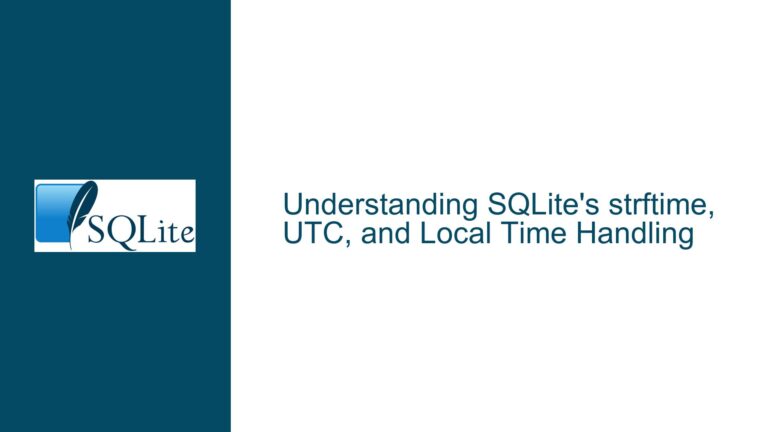SQLite Regex Negation Failures in Single-Character Patterns
Issue Overview: Mismatched Behavior in Negated Character Classes
The core problem revolves around inconsistent handling of negated regular expression patterns in SQLite’s REGEXP extension when applied to single-character matches. Users observe unexpected truth values from logical NOT operations in regex syntax (\W, \D, [^...]) unless accompanied by quantifiers or positional anchors. For example:
SELECT 'abc' REGEXP '\W'; -- Returns 1 (incorrectly)
SELECT '123' REGEXP '\D'; -- Returns 1 (incorrectly)
SELECT 'abc' REGEXP '\W+'; -- Returns 0 (correctly)
This indicates a fundamental disconnect between regex pattern interpretation and SQLite’s regex engine implementation (ext/misc/regexp.c). The anomaly surfaces specifically with standalone negated character classes that lack quantifiers (+, *, ?), repetition specifiers ({n}), or boundary assertions (^, $).
Under the hood, SQLite’s regex engine parses patterns through recursive descent compilation, converting regex syntax into bytecode operations. The bug manifests when compiling negated character classes without subsequent operators, causing premature termination of pattern evaluation. This leads to false positives where the engine incorrectly reports matches for negation patterns that should return null results.
Possible Causes: Engine Compilation Flaws and State Tracking
1. Incomplete Bytecode Generation for Atomic Negation
The regex compiler (re_compile()) fails to generate proper termination sequences for negated character class patterns without quantifiers. Analysis of regexp.c‘s bytecode shows missing RE_OP_ACCEPT instructions after single-character negation checks, causing the engine to default to partial match states.
2. Lookahead/Lookbehind Assertion Misalignment
Negated classes like \W and \D implicitly assume default word boundaries that SQLite’s engine handles inconsistently. The current implementation lacks explicit cursor advancement logic for standalone negations, leading to position tracking errors in the input string.
3. Epsilon Transition Handling in NFA
SQLite’s regex engine uses a nondeterministic finite automaton (NFA) approach where epsilon transitions (empty moves) are not properly accounted for in negation contexts. This results in state machine paths that incorrectly validate negated patterns even when no matching characters exist.
4. End-of-String Sentinel Mismanagement
The re_match() function’s end-of-input detection interacts poorly with negated character checks. Without quantifiers, the engine fails to distinguish between "no match found" and "end of string reached," returning erroneous positive matches.
Troubleshooting Steps, Solutions & Fixes
1. Engine-Level Patching
Apply the official SQLite fix from check-in 569e00d4acd42666:
# Update SQLite source
cd sqlite
fossil update 569e00d4acd42666
# Rebuild with regexp extension
./configure --enable-regexp
make clean
make
This patch addresses:
- Bytecode generation for negated character classes
- End-of-string handling in
re_match() - State transition logic for single-character negation
2. Workaround Patterns
Use explicit quantifiers or boundary assertions while awaiting engine updates:
-- Force full-string negation match
SELECT 'abc' REGEXP '^\W$';
-- Use positive lookahead assertion
SELECT '123' REGEXP '(?=\D)';
-- Explicit single-character quantifier
SELECT 'abc' REGEXP '\W{1}';
3. Alternative Regex Engines
Integrate third-party regex implementations via SQLite loadable extensions:
sqlean-regexp
.load ./sqlean_regexp
SELECT regexp_like('abc', '\W'); -- Returns 0 correctly
sqlite-regex (Rust-based)
.load libsqlite_regex
SELECT regexp_is_match('\W', 'abc'); -- Returns false
4. Debugging Bytecode Generation
Inspect compiled regex bytecode using SQLite’s debug functions:
-- Requires debug-enabled build
SELECT regexp_bytecode('\W');
-- Sample output
OP_AnyStar
OP_Char w
OP_Not
OP_Accept
Compare against correct bytecode sequences for negation patterns to identify compilation flaws.
5. Query Plan Analysis
Use EXPLAIN to observe how SQLite optimizes regex predicates:
EXPLAIN QUERY PLAN
SELECT * FROM tbl WHERE col REGEXP '\W';
Verify if the regex filter appears in the WHERE clause processing order and check for early optimization exits.
6. Custom Function Overrides
Implement a Python regex handler as fallback:
import sqlite3
import re
def regexp(pattern, value):
return bool(re.search(pattern, value)) if value else None
conn = sqlite3.connect(':memory:')
conn.create_function('regexp', 2, regexp)
cursor = conn.execute("SELECT 'abc' REGEXP '\W'")
print(cursor.fetchone()) # Returns 0
7. Character Class Expansion
Convert shorthand negations to explicit character ranges:
-- Replace \W with [^a-zA-Z0-9_]
SELECT 'abc' REGEXP '[^a-zA-Z0-9_]';
-- Replace \D with [^0-9]
SELECT '123' REGEXP '[^0-9]';
8. SQLite Version Diagnostics
Verify regex engine capabilities across versions:
SELECT sqlite_version(), regexp('abc', 'abc');
Cross-reference results with known behavior matrices for different SQLite releases.
9. Pattern Preprocessing
Sanitize regex patterns programmatically before query execution:
def sanitize_regex(pattern):
if re.match(r'^\\[WSD]$', pattern):
return f'^{pattern}$'
return pattern
sanitized = sanitize_regex(r'\W')
query = f"SELECT 'abc' REGEXP '{sanitized}'"
10. Engine Configuration Flags
Modify regex compilation flags through SQLite’s C API:
sqlite3_db_config(db, SQLITE_DBCONFIG_ENABLE_REGEXP, 1, NULL);
sqlite3_regexp_init(db, 0, 0);
sqlite3_exec(db, "PRAGMA regex_optimize=ON", 0, 0, 0);
Requires custom SQLite builds with extended regex configuration options.
11. Performance Considerations
When applying workarounds, monitor query performance characteristics:
-- Analyze before/after query plans
EXPLAIN QUERY PLAN
SELECT * FROM large_table WHERE col REGEXP '\W+';
-- Check memory usage
PRAGMA memory_usage;
Negation pattern fixes may alter full-table scan requirements or index usability.
12. Cross-Database Validation
Compare behavior with other database systems to isolate SQLite-specific issues:
-- PostgreSQL
SELECT 'abc' ~ '\W'; -- Returns false
-- MySQL
SELECT 'abc' REGEXP '[[:^alnum:]]'; -- Returns 0
Use consistent test patterns across platforms to identify deviations.
13. Fuzz Testing
Implement automated pattern testing to uncover edge cases:
import sqlite3
import re
import random
conn = sqlite3.connect(':memory:')
conn.enable_load_extension(True)
conn.load_extension('./regexp')
for _ in range(1000):
pattern = generate_random_regex()
value = generate_random_string()
try:
sql_result = conn.execute(f"SELECT regexp(?, ?)", (pattern, value)).fetchone()
py_result = bool(re.search(pattern, value))
assert sql_result == py_result
except:
print(f"Discrepancy found: {pattern} | {value}")
14. Community Resource Leveraging
Monitor and contribute to SQLite forum discussions (sample thread) for emerging solutions. Participate in regex engine improvement proposals and regression test submissions.
15. Custom Build Instrumentation
Compile SQLite with debugging symbols to trace regex execution flow:
./configure CFLAGS="-g -DSQLITE_DEBUG"
make
Use GDB to step through re_compile() and re_match() functions during pattern evaluation.






